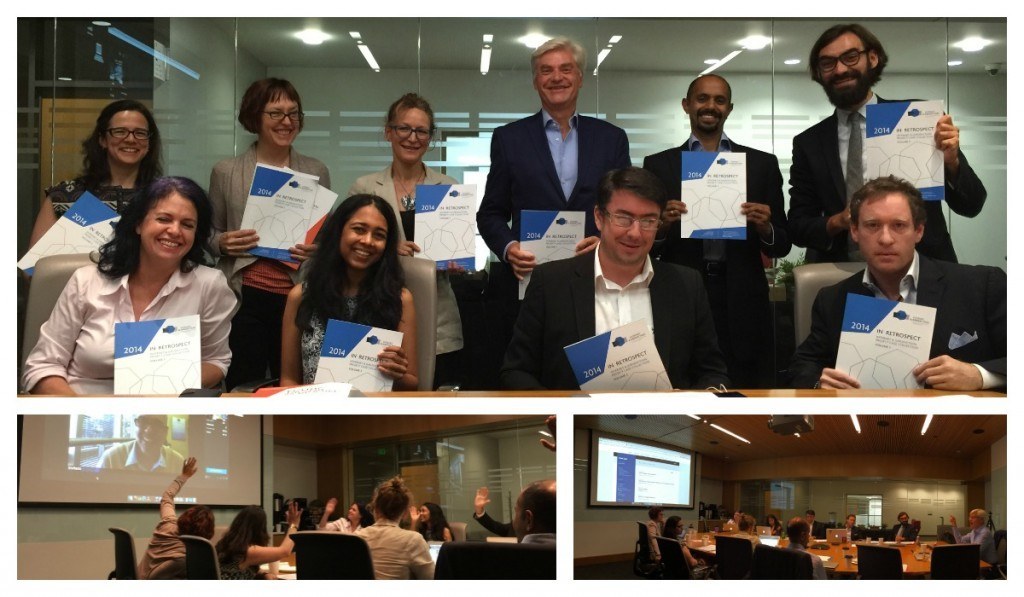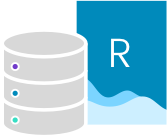14
Sep 2015
3rd Annual Observatory Meeting at Stanford University
I&J convened
September 14, 2015
Enabling an Evidence-based Dialogue Process
On September 14, 2015, the Internet & Jurisdiction Observatory’s third annual meeting took place in Stanford, California (USA). The Internet & Jurisdiction Project partnered in 2015 with the Stanford Law School’s Center for Internet and Society to organize this meeting, which gathered international experts from world-class universities to discuss global trends and to provide expert input into the Internet & Jurisdiction process.

Members of the Internet & Jurisdiction Observatory holding their annual editions of Retrospect, I&J's flagship publication.
The purpose of the third Internet & Jurisdiction Observatory Meeting was to review progress made by the Internet & Jurisdiction policy network. The participants scrutinized the emerging Internet & Jurisdiction framework for multistakeholder cooperation from an interdisciplinary legal point of view and discussed how to work together to advance its components.
Members of the Internet & Jurisdiction Observatory discussed different theoretical modalities for how to collect emerging norms and best practices with regards to cross-border requests for domain seizures, content takedowns and access to user data, that will become the normative foundation of the transnational due process framework.
Moreover, the participants highlighted the benefits for states, international organizations, business, users, and academia to have a common Legal Database that contains the different national laws to justify requests for domain seizures, content takedowns and access to user information. Concrete modalities to integrate world leading universities in the effort of creating such a database, which is a component of the emerging Internet & Jurisdiction framework, were discussed.
Members from Harvard University, Columbia University, National Law University Delhi, Rio de Janeiro Institute for Technology, and Society and Universidad Externado of Colombia participated onsite, and several other I&J Observatory experts participated in the conference remotely.
The I&J Observatory
The members of the Internet & Jurisdiction Observatory provide expert input into the global multi-stakeholder dialogue process and help the Internet & Jurisdiction Project to detect trends related to the tension between the cross-border nature of the Internet and national jurisdictions around the world. Based on a progressive crowd-based filtering process, they identify the most relevant cases. This ranking is the backbone of the Internet & Jurisdiction Retrospect, our monthly newsletter that informs the different stakeholders who participate in the ongoing dialogue process about emerging trends.
Enabling an Evidence-based Dialogue Process
On September 14, 2015, the Internet & Jurisdiction Observatory’s third annual meeting took place in Stanford, California (USA). The Internet & Jurisdiction Project partnered in 2015 with the Stanford Law School’s Center for Internet and Society to organize this meeting, which gathered international experts from world-class universities to discuss global trends and to provide expert input into the Internet & Jurisdiction process.

Members of the Internet & Jurisdiction Observatory holding their annual editions of Retrospect, I&J's flagship publication.
The purpose of the third Internet & Jurisdiction Observatory Meeting was to review progress made by the Internet & Jurisdiction policy network. The participants scrutinized the emerging Internet & Jurisdiction framework for multistakeholder cooperation from an interdisciplinary legal point of view and discussed how to work together to advance its components.
Members of the Internet & Jurisdiction Observatory discussed different theoretical modalities for how to collect emerging norms and best practices with regards to cross-border requests for domain seizures, content takedowns and access to user data, that will become the normative foundation of the transnational due process framework.
Moreover, the participants highlighted the benefits for states, international organizations, business, users, and academia to have a common Legal Database that contains the different national laws to justify requests for domain seizures, content takedowns and access to user information. Concrete modalities to integrate world leading universities in the effort of creating such a database, which is a component of the emerging Internet & Jurisdiction framework, were discussed.
Members from Harvard University, Columbia University, National Law University Delhi, Rio de Janeiro Institute for Technology, and Society and Universidad Externado of Colombia participated onsite, and several other I&J Observatory experts participated in the conference remotely.
The I&J Observatory
The members of the Internet & Jurisdiction Observatory provide expert input into the global multi-stakeholder dialogue process and help the Internet & Jurisdiction Project to detect trends related to the tension between the cross-border nature of the Internet and national jurisdictions around the world. Based on a progressive crowd-based filtering process, they identify the most relevant cases. This ranking is the backbone of the Internet & Jurisdiction Retrospect, our monthly newsletter that informs the different stakeholders who participate in the ongoing dialogue process about emerging trends.


